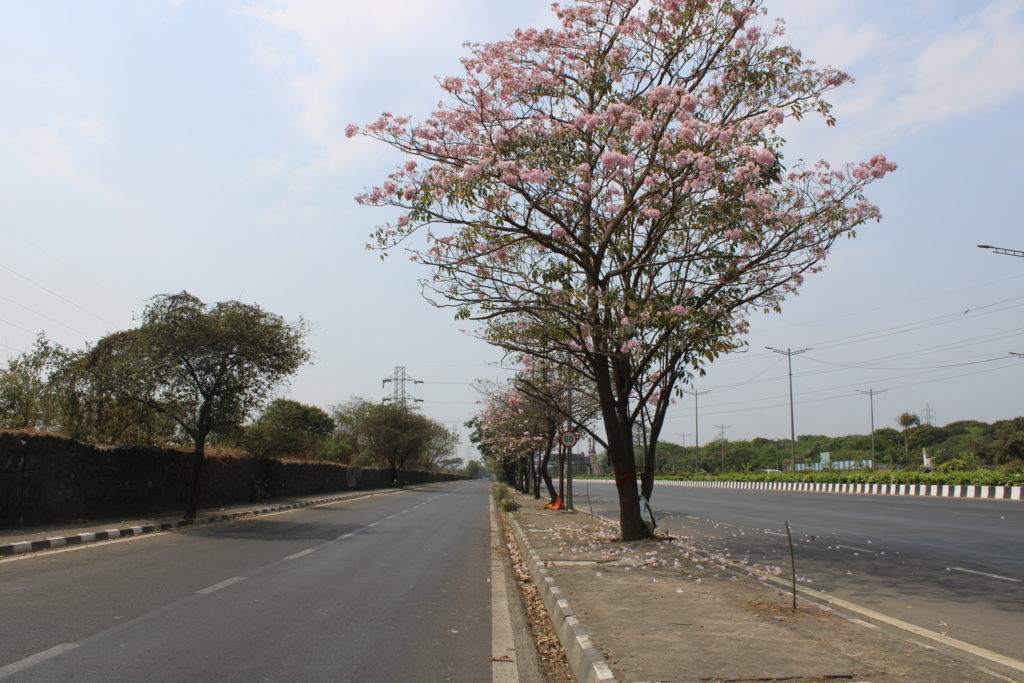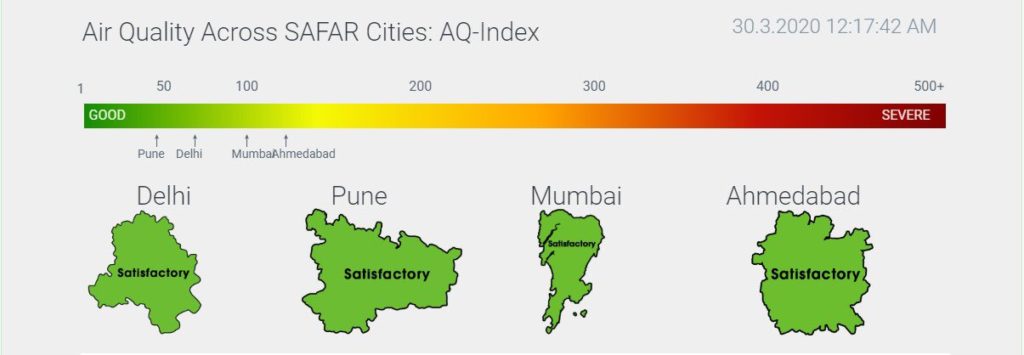Nationwide lockdown- A mantra to heal the Nature?

As India goes into a nationwide lockdown, skies have become clearer and levels of pollution have dipped (MIG Photos/Varsha Singh)
With the entire nation locked down in the fight against a deadly virus, several reports of clean air, reduced pollution levels and threatened species re-emerging have surfaced. Is a pandemic the only way nature can heal?
Painted in the shades of light blue, the sky of Delhi is marked with strokes of red, pink, lavender, and grey. As the sun sets against the buildings, and the evening matures, a dark sky with surprisingly increased number of stars envelopes the capital city. The weather application on the smartphone shows the air quality as “good” and the empty streets are celebrating the joy, so are the crickets with their constant cacophony. With the people locked in their houses, in a precautionary measure against the deadly virus, nature seems to breathe anew. Usually, topping the dubious list of the world’s most polluted nation, with six of the world’s most polluted cities located here, a locked down India has a different story to narrate.
An improved quality of air
With the lockdown came the shutting down of industries, a pause in construction activities and a near total stoppage of vehicular traffic. All the three activities are major causes of pollution. Hence, within a few days of a nationwide lockdown, more than 90 Indian cities have reported minimal levels of air pollution. While the capital city, which was earlier no less than a living chimney, has reported a drop of 30pc in the fine particulate pollutant PM2.5, a 15pc dip has been recorded in Ahmedabad and Pune, as confirmed by the centre run System of Air Quality and Weather Forecasting and Research (SAFAR).
Even the levels of Nitrogen Oxide, the notorious pollutant that escalates respiratory discomforts has seen a dip in its levels. “There is a drastic change in the air quality index before and right now. The lockdown is definitely helpful in recovering nature,” Seema Sharma, a professor of environmental studies working in close collaboration with the Resilience Centre based in Delhi tells Media India Group.
As per the data shared by Central Pollution Control Board, “good” air qualities have been reported from 39 cities, while 51 cities have shown “satisfactory” levels of air quality.
Many are urging the society as well as the government to take this as a wake-up call and end their usual insensitivity towards the environment. “For the first time, I believe our present generation will discover the critical importance and need for a focus on public health and the quality of air we breathe,” Ravina Kohli, an environmental activist who worked closely with the #MyRightToBreathe campaign, was quoted by Indian media.
“I am surprised by being able to watch a sky full of so many stars. A star studded sky has become such a rare site in metropolitan cities. This shows, how much damage the humans have caused to nature. Just a few days of lockdown, and the nature has begun to heal itself!” exclaims Sonali Arora, a student from Delhi.
However, the World Meteorological Organiastion says that it is too early to assess the implications of this localised improvement. Many fear that as soon as the restrictions are withdrawn, there might be even more pressure on the environment as businesses would ramp up their activities to make up for the losses incurred during this time period.
Dramatic dips in waste production!
With all the major industries, except for those of essential commodities shut, a dramatic dip in the production of waste has also been observed. As per the officials, the main source of waste is only the household and hospitals now. However, as a precautionary measure, in some areas the waste collectors and janitors are opting to go for waste collection on alternate days instead of their regular routine of collecting the waste daily.
“A lot of precautions are being taken care of to control the situation. I was surprised and equally proud to find our janitor in the requisite mask with a handy bottle of sanitiser. Unlike earlier, they come for occasional rounds now,” shares Kamna Mishra, a resident of Delhi.
According to the official data, the daily waste generation of Ahmedabad is down to 2,500 metric tonnes as compared to the earlier levels of 4,000 metric tonnes in Ahmedabad.
“There is no littering in public places throughout! There is a much better waste management at household levels as well and a better coordination between citizens and waste collectors,” adds Seema Sharma.
Fauna makes a comeback
Spotted Malabar civet… A critically endangered mammal not seen until 1990 resurfaces for the first time in India during lockdown. pic.twitter.com/JX18O9r4zn
— Nature & Animals ? (@AnimalsWorId) March 27, 2020
Within a few days of lockdown, videos of animals re-emerging in the urban settlements and roaming freely have made rounds on social media. One such video shows an endangered covet roaming freely around the streets of Kerala’s Meppayur Town, while another shows a relaxed Nilgai crossing the empty roads of an otherwise overcrowded Noida, a suburb of Delhi.
People have been posting regularly on social media about the increase in the number of chirping birds waking them up in the morning and the beautiful insects paying their plants a visit.
“I was surprised to again find a group of colourful butterflies hovering over my potted plants. The last time I remember butterflies visiting my terrace was when I was in school, it has been so many years now. Even the ladybirds and dragonflies have made a comeback,” Manish Kumar, a student from Delhi tells Media India Group.
“I can hear so many different birds throughout the day, with most of these voices being new to my ears. As much as I am worried about the ongoing situation, it’s heart-warming to have our little friends back,” shares Chandan Shukla, an entrepreneur from Bangalore.
While the nature has shown signs of recovery, its fate after the lockdown is lifted remains uncertain.










